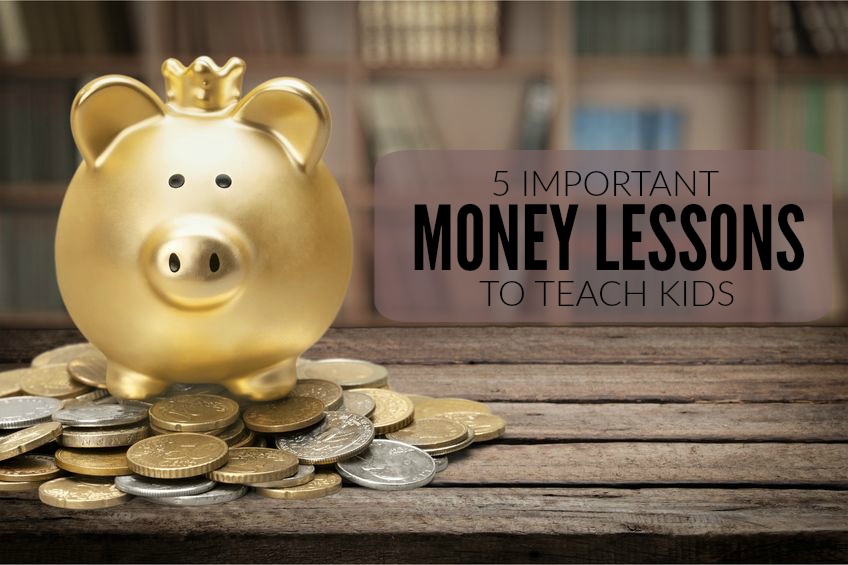Teaching kids the money lessons is not generally a subject taught in schools, in fact it’s not until they reach higher primary levels that some of the basic formulas for calculating simple interest gets added to their curriculum. However, that’s not the mistake of the education system, this is where we as parents should take up the responsibility of educating our kids about the intricacies of money and how to earn it, save it and invest it. Teaching your children the value of money can be one of the greatest investments in your life. Here are few simple but effective tips on how you can educate your kids on money.
1. Introduce your kids to money Teach your children the money basics such as different coins and notes. Open your wallet, and ask them to identify the different denominations of coins and notes. Once they are familiar with different denominations of each currency, reinforce some basic age-appropriate math concepts to help them understand how money is used.
2. Educate kids on How ATM works
Kids are surprised on watching their parents put a strip of card in a machine, press a few buttons and receive few currency notes at the ATM. It is essential to educate them on how ATM actually works. Explain them clearly that the money you have earned is deposited in a bank and then a required amount is withdrawn via the automatic teller machine.
3. Use their Shopping habits to your advantage
If your kids like shopping, take them to the super market. Give them $50 and ask them to shop their favorite T-shirt for that budget. When they are about to buy their favorite thing which is within their budget, try to persuade them to check out at the next store. Show them other T-shirts that are pretty but more than their budget. Now they have to choose between buying T-shirt that costs $50, or they can get back home and save money for some more time to buy that pretty expensive T-shirt. Although, this sounds counterproductive, it demotivates your child buying clothes instead of encouraging them buying. But this trick will definitely help them in the long run and they will develop that mindset of saving for a better future.
4. Give them Pocket money
Give your children pocket money every week. This money should be stored in a transparent container so that any additions can be noticed. Pocket money must be associated with a fixed set of chores and the amount should increase or decrease with the number of chores completed in a week. This pocket money can be used by the child but with guidance. Don’t worry even your child wastes a portion of this money because this makes them learn how to budget. By spending too much on unwanted stuff they will learn that there is no physical growth of their money. Gradually, they will learn to save and cut back on frivolous stuff in order to buy other things.
5. Teach them to Invest
Ask them to save away some money from their pocket expenses. Let them deposit this money in their savings bank account. Banks offer competitive and attractive interests specifically for children’s’ accounts. Show your children the amount of interest added to the money saved by them. This is a great lesson about investment. Let them buy their favorite thing from the invested amount at the end of every year. You may add extra cash to this amount so that they can buy their favorite bicycle or video game.
6. Educate kids about credit cards
Tell your kids how credit cards work and the fact that when bills are not paid on time, you have to pay huge amount of interests. Educating your child on developing good credit card habits helps them in the long run.
7. Prolonged Exposure to Harsher Realities of Life
Just because you are wealthy it doesn’t mean that your child should get expensive gifts for no reason. Gifts should be reserved for special occasions if kids are to value them. So if your child demands an extravagant gift, you can gently suggest that this demand will become their Christmas or birthday gift. Also, children from wealthy families have limited exposure to poverty. Hence, they should be taken to poverty-stricken areas, children’s hospitals and orphanages frequently to show how the bulk population struggle for their lives. Without getting exposed to such realities of life, wealthy children cannot be taught the lesson of responsibility that should accompany their wealth.
8. Be a Role Model
Kids watch their parents’ behavior. If you run on debts there’s a good chance they will too. If you are careless about spending, they’ll find ways to blow their money recklessly. To teach them about saving money, you have to do so yourself.
AUTHOR BIO:
Brianne Walter is a freelance journalist who has been writing about mobile technology, customer relationship management and women’s health for more than a decade. These days she is busy to contributes on seomorpheus

